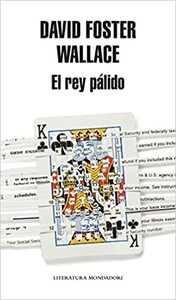Take a photo of a barcode or cover
adventurous
challenging
emotional
funny
informative
inspiring
lighthearted
reflective
slow-paced
Plot or Character Driven:
A mix
Strong character development:
Complicated
Loveable characters:
Yes
Diverse cast of characters:
No
Flaws of characters a main focus:
Yes
Pulitzer in Fiction for 2012 was not awarded. They couldn't decide between:
[b:Swamplandia!|8584686|Swamplandia!|Karen Russell|http://photo.goodreads.com/books/1320536498s/8584686.jpg|13438215], [b:Train Dreams|1821187|Train Dreams|Denis Johnson|http://photo.goodreads.com/books/1188814001s/1821187.jpg|2046778], and this novel.
Had I not been trapped on an intercontinental flight, I might still be trying to read this novel. The Times got it right when they said Wallace "depicts an America so plagued by tedium, monotony and meaningless bureaucratic rules and regulations that its citizens are in danger of dying of boredom."
Unfortunately, I was bored too, and often frustrated.
I'm afraid post-post-modern novels are just not my cup of tea.
[b:Swamplandia!|8584686|Swamplandia!|Karen Russell|http://photo.goodreads.com/books/1320536498s/8584686.jpg|13438215], [b:Train Dreams|1821187|Train Dreams|Denis Johnson|http://photo.goodreads.com/books/1188814001s/1821187.jpg|2046778], and this novel.
Had I not been trapped on an intercontinental flight, I might still be trying to read this novel. The Times got it right when they said Wallace "depicts an America so plagued by tedium, monotony and meaningless bureaucratic rules and regulations that its citizens are in danger of dying of boredom."
Unfortunately, I was bored too, and often frustrated.
I'm afraid post-post-modern novels are just not my cup of tea.
Mostly I find discussions of what is and is not a novel to be a bit bland and unimportant, but for the purposes of a review I think it is probably important to stress that The Pale King is not what I would call a novel. It is a posthumously compiled Wallacian stream-of-conscious not of a person but of a place and idea, the place being an IRS processing center and the idea being how waves of humanity crash against pure, unadulterated tedium. Stream-of-consciousness is not quite accurate though, implying a type of fluidity that is a bit counter to DFW's whole thing. Woolf writes a stream of ideas flowing into each-other and mixing together in whorls, DFW plays with a bunch of legos and sharp corners. A Koch snowflake is made by recursively altering the line-segments comprising a triangle so that each has a triangle coming out of it, and each of the lines in that triangle has a triangle coming out of it, and so on. The Pale King likewise has a plot within each plot that kind of makes it look like it follows the curve of a story but is not in itself a story.
Anyways, the editor did a stupendous job here. To my mind, persnickety and patient and perhaps a bit inoculated against the excesses of DFW by reading and enjoying his other works, I found (re)reading The Pale King to be a lovely experience.
Anyways, the editor did a stupendous job here. To my mind, persnickety and patient and perhaps a bit inoculated against the excesses of DFW by reading and enjoying his other works, I found (re)reading The Pale King to be a lovely experience.
There is the skeleton of a great book here but so much is clearly not done, it becomes confusing: not for ordinary modernism-means-less-exposition reasons, but because there is just a lot that isn't rendered consistent, or contextualized correctly. Moments of hilarity, pathos and insight, but they're not centered in the way I'm sure DFW would have wanted.
I think this is maybe more about the concept of focus than about boredom and I'm sad that we'll never be able to say for sure.
I would liken The Pale King to the collected works of John Lennon. When it's good, it's the greatest thing on earth. When it's not, you are left confused and bored. Luckily, much like Lennon, The Pale King contains a great deal more of the former than the latter.
It's been a while since I've written a review but this book deserves mentioning, especially given my anticipation and excitement over its release. As soon as you open the cover flaps, you see that THE PALE KING is openly labeled an "unfinished novel." Because of that, you have to take that into account while reading the book and, when you are finished, mulling over what you just read. Because of the plethora of information available surrounding the book and its overall completeness, I'll take a pass on reiterating it. What you'll find here is some truly fantastically written prose and a sense of how the book is unfolding. Of course there are a great deal of loose ends and characters that more or less pop in and out of the narrative, but you should expect that going in to reading an unfinished novel.
When THE PALE KING is good, it's really good! The prose we do have feels more polished, more satisfying and just overall better than most literature being released these days. Perhaps another way of looking at THE PALE KING is that if a story collection with an overarching narrative, something like a protracted version of what Denis Johnson did in JESUS’ SON. One of the coolest features of THE PALE KING is the inclusion of a number of David Foster Wallace’s notes regarding where he saw the novel going, what might happen or has happened to certain characters, questions for addressing later, etc. It’s really fascinating to get a look into the creative process of arguably one of the most talented writers to come along in recent times.
In a nutshell, there is a lot to dig about THE PALE KING. Adjusting your expectations before diving in is the key. When you take it for what it is—rather than judging it for what it isn’t—it’s becomes a much more satisfying literary experience. I highly recommend it!
When THE PALE KING is good, it's really good! The prose we do have feels more polished, more satisfying and just overall better than most literature being released these days. Perhaps another way of looking at THE PALE KING is that if a story collection with an overarching narrative, something like a protracted version of what Denis Johnson did in JESUS’ SON. One of the coolest features of THE PALE KING is the inclusion of a number of David Foster Wallace’s notes regarding where he saw the novel going, what might happen or has happened to certain characters, questions for addressing later, etc. It’s really fascinating to get a look into the creative process of arguably one of the most talented writers to come along in recent times.
In a nutshell, there is a lot to dig about THE PALE KING. Adjusting your expectations before diving in is the key. When you take it for what it is—rather than judging it for what it isn’t—it’s becomes a much more satisfying literary experience. I highly recommend it!
A lot of individual, seemingly meaningful stories of IRS workers that end up nowhere. Working at the IRS isn’t a happy ending, but it somehow makes the characters all that more human. Another of my absolute favorite books.
When DFW walked out onto that patio and hung himself in Claremont, CA, he left behind a neatly-stacked manuscript of his novel-in-progress, THE PALE KING. That someone could take it upon themselves to mold these pages into a publishable novel is a minor miracle. Wallace was not a well man--and had not been well for many years. Yet, in this nonlinear, passive aggressive masterpiece about what might be termed the "last great hours of the Old-School Internal Revenue Service," Wallace's love for 1980's bureaucratic dysfunction and wringing every last drop of profundity out of almost maddeningly tedious minutiae comes shining through.
I realized towards the end of this novel that it was more like a series of linked short stories. I listened to this on audiobook, while concurrently reading along with the print novel. (Sorry--but I hate overuse of footnotes and that's why I never finished INFINITE JEST.) But I do love DFW's short stories and essays and thus, the fragmentary nature of THE PALE KING kind of worked for me--but don't ask me about main characters, story arcs and whatnot in THE PALE KING--they just don't apply here. However, that a novel this dense and convoluted--a novel that owes a substantial debt to Georges Perec, Thomas Pynchon and William Gaddis--should become a bestseller, says a lot of good things about the state of publishing in America today.
I realized towards the end of this novel that it was more like a series of linked short stories. I listened to this on audiobook, while concurrently reading along with the print novel. (Sorry--but I hate overuse of footnotes and that's why I never finished INFINITE JEST.) But I do love DFW's short stories and essays and thus, the fragmentary nature of THE PALE KING kind of worked for me--but don't ask me about main characters, story arcs and whatnot in THE PALE KING--they just don't apply here. However, that a novel this dense and convoluted--a novel that owes a substantial debt to Georges Perec, Thomas Pynchon and William Gaddis--should become a bestseller, says a lot of good things about the state of publishing in America today.
DFW is my favorite author and I was heartbroken after his death. I didn't run out and buy this book as soon as it was published. I finally got it, started it once, then put it down even though I was taking great pleasure in it. I'm afraid to read/finish it because it will mean that I never get to read anything new by DFW ever again. I don't know when I'll start this one again...



